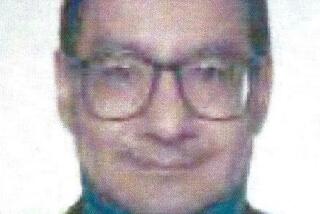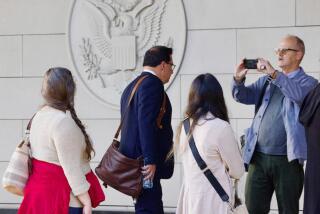Family of U.S. contractor Alan Gross pressed for his release for years
When American contractor Alan Gross received a call from his lawyer Tuesday morning telling him he would be freed from the Cuban military hospital where he had been imprisoned for five years, he was silent.
Then, according to a spokeswoman, he said, “I’ll believe it when I see it.”
On Wednesday morning, finally onboard an American aircraft heading into U.S. airspace, he stood up and took a deep breath. One by one, he called his daughters - one in Tel Aviv and one in Oregon - and told them, “I’m free.”
A contractor for USAID, the federal government’s foreign aid and development agency, Gross was arrested in 2009 on his fifth trip to the island for providing telecommunications equipment to Cuba’s Jewish community. In 2011, Cuban officials sentenced him to 15 years in prison for “acts against the independence” of the nation.
Gross, upbeat and smiling, told reporters in Washington on Wednesday that his wife had his “endless gratitude, love and respect” for her “extraordinary and determined efforts.”
His detention made Gross a symbol of stalled U.S.-Cuba relations, and his release was cast as one of the final puzzle pieces for the historic normalization of relations announced Wednesday between the two nations, at a stalemate for half a century.
But during his imprisonment, Gross was first and foremost a husband and a father to family members and supporters who pushed for his return home, saying his prison sentence had left him weak, wracked by chronic pain and partially blind.
Through years of negotiations and visits by congressional delegations, Gross’ family, led by his wife, asserted that the man they knew was caught up in a political situation much larger than him, and called upon leaders not to forget that he was an American citizen whose family was suffering.
Judy Gross and her supporters repeatedly pleaded with the federal government to take more aggressive action to help her husband, and challenged a leadership they often saw as ineffective. Over the course of five years, Gross lost more than 100 pounds, a number of teeth and part of his vision, they said.
In a series of statements during his detention, Judy Gross called upon the two nations to “do the humane thing.” This month, in marking the five-year anniversary of his detention, she said her husband had “paid a terrible price for serving his country and community” and had stopped receiving visitors, including his family and American diplomats.
“I am afraid we are at the end,” she said.
Gross had sent messages to the outside world via his family throughout his imprisonment. In April, after he launched a nine-day hunger strike, he said that he was refusing food in protest over “mistruths, deceptions, and inaction by both governments.”
“I’m now eligible for Medicare, but what I want is presidential care,” he said on the eve of his 65th birthday. “I want the president to care.”
Administration officials asserted that Gross’ detention stood in the way of “more constructive relations” with the island nation, which the government put under embargo during the Kennedy administration, halting trade and travel between the nations.
Gross was unfairly imprisoned and used as a pawn in a dysfunctional U.S.-Cuba relationship, said Ronald Halber, executive director of the Jewish Community Relations Council of Greater Washington and a friend of Gross who advocated for his release.
But ultimately, Gross’ arrival home served as a constructive step toward improving that relationship, Halber said.
“One of the things Alan was very pleased about was if his release could further strengthen U.S.-Cuban relations,” he said. “He would be thrilled that could happen.”
In his remarks Wednesday, Gross displayed some of his trademark sense of humor, noting that he had been released on the first day of Hanukkah.
“Today is the first day of Hanukkah, and I guess so far it’s the best Hanukkah I’ll be celebrating for a long time,” he said.
Halber said Gross often maintained that sense of humor in their conversations and emails during the imprisonment. At one point, the two men kept up their spirits by proposing book titles for a memoir Gross was considering. Among the choices was “90 Miles: Too Far to Swim,” Halber said, referring to the distance between Cuba and the mainland United States.
But, he said, Gross demonstrated a real commitment to his family and his Jewish values during his imprisonment, and that contributed to his survival.
“If anyone deserves the credit, it’s Alan for persevering, his wife for sustaining, and his attorney and the United States government for initiating,” Halber said.
Twitter: @mtthnsn
More to Read
Start your day right
Sign up for Essential California for news, features and recommendations from the L.A. Times and beyond in your inbox six days a week.
You may occasionally receive promotional content from the Los Angeles Times.






